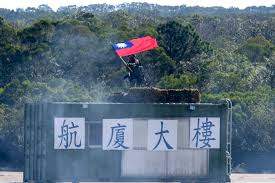US support for Taiwan ‘rock-solid’ as China again sends warplanes
Monday, January 25, 2021
Categories: ASCF News National Preparedness Energy Independence

Chinese air force planes including 12 fighter jets entered Taiwan’s air defence identification zone for a second day, as tensions rise near the island just days into US President Joe Biden’s new administration.
After eight Chinese bomber planes and four fighter jets flew into Taiwan’s defence zone on Saturday in the South China Sea, a further 15 flew into the same air space on Sunday.
Taiwan’s defence ministry said China sent six J-10 fighters, four J-16s, two SU-30s, a Y-8 reconnaissance aircraft, and two Y-8 anti-submarine aircraft.
Taiwan’s air force was sent up to respond, it added.
“Airborne alert sorties had been tasked, radio warnings issued and air defence missile systems deployed to monitor the activity,” the ministry said.
China has yet to comment. It has previously said such actions are aimed at defending the country’s sovereignty and designed to act as a warning against “collusion” between the United States and Taiwan.
China views democratically ruled Taiwan as its own territory, and has in the past few months increased military activity near the island, which enjoys strong bipartisan support in Washington.
But China’s activities over the weekend mark a ratcheting up with fighter jets and bombers being dispatched rather than reconnaissance aircraft as had generally been the case in recent weeks.
The US Department of State on Saturday said it “notes with concern the pattern of [China’s] ongoing attempts to intimidate its neighbours, including Taiwan”.
“We urge Beijing to cease its military, diplomatic, and economic pressure against Taiwan and instead engage in meaningful dialogue with Taiwan’s democratically elected representatives,” spokesperson Ned Price said in a statement.
Washington will continue to deepen ties with Taiwan and ensure its defence from Chinese threats while supporting a peaceful resolution of issues between the sides, the statement said.
“Our commitment to Taiwan is rock-solid and contributes to the maintenance of peace and stability across the Taiwan Strait and within the region,” it added.
Lo Chih-cheng, a senior legislator for Taiwan’s ruling Democratic Progressive Party who sits on parliament’s foreign affairs and defence committee, told Reuters news agency that China was trying to deter the new US government from backing the island.
“It’s sending a message to the Biden administration,” he said.
The latest Chinese overflight came on the heels of Biden’s inauguration on Wednesday, emphasising the island’s enduring position in the panoply of divisive issues between the sides that also include human rights, trade disputes and – most recently – questions about China’s initial response to the coronavirus pandemic.
Biden’s administration has shown little sign of reducing pressure on China over such issues, although it is seen as favouring a return to more civil dialogue after Donald Trump’s presidency.
Taiwan’s foreign ministry expressed its thanks for the show of US support on Sunday, adding it would work closely with the Biden administration to strengthen their partnership.
Taiwan and China separated amid civil war in 1949 and China says it is determined to bring the island under its control, by force if necessary.
The US switched diplomatic recognition from Taipei to Beijing in 1979 but is legally required to ensure Taiwan can defend itself.
Emily Horne, spokeswoman for the White House National Security Council, also reaffirmed the US’s commitment to Taiwan after the island’s de facto ambassador in Washington, Hsiao Bi-khim, attended Biden’s swearing-in on Wednesday.
In a final swipe at China, the Trump administration’s outgoing United Nations ambassador tweeted that it was time for the world to oppose China’s efforts to exclude and isolate Taiwan, drawing sharp criticism from Beijing.
Ambassador Kelly Craft accompanied the tweet with a photo of herself in the UN General Assembly Hall, where the island is banned.
She carried a handbag with a stuffed Taiwan bear sticking out of the top, a gift from Taiwan’s representative in New York, Ambassador James Lee.
Tsai has sought to bolster the island’s defences with the purchase of billions of dollars in US weapons, including upgraded F-16 fighter jets, armed drones, rocket systems and Harpoon missiles capable of hitting ships and land targets.
She has also boosted support for Taiwan’s indigenous arms industry, including launching a programme to build new submarines to counter China’s ever-growing naval capabilities.
China’s increased threats come as economic and political enticements bear little fruit, leading it to stage war games and dispatch fighter jets and reconnaissance planes on an almost daily basis towards the island of 24 million people, which lies 160km (100 miles) off China’s southeast coast across the Taiwan Strait.
Photo: A Taiwanese soldier waves a Taiwan national flag during a military exercise in Hsinchu County, northern Taiwan, on January 19, 2021 [Sam Yeh/AFP]
Link: https://www.aljazeera.com/news/2021/1/24/us-support-for-taiwan-rock-solid-after-china-sends-warplanes




